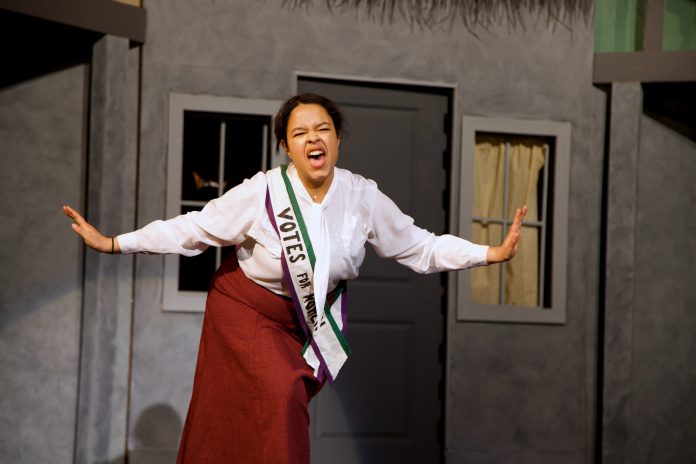At the start of every spring semester, students jump back into school knowing their first weekend back can be spent enjoying the Sinfonicron Light Opera Company’s annual production. This year, director Sofia Quinteiro ’20 and producer John Lesko ’21 undertook the Gilbert and Sullivan show “Ruddigore,” putting a more modern touch on this mid-19th century opera.
The audience is first met with the charming set, which effortlessly depicts a rustic early 20th century town in Cornwall amid the Women’s Suffrage Movement. Letting the audience know that the show is officially underway, the orchestra begins playing the overture. Under the guidance of Orchestral Director Ayush Joshi ’20, the orchestra performed excellently and continued to impress throughout the performance, bringing life to the long-winded operatic songs. The pit was situated entirely behind the set, and yet the sound flowed gracefully alongside the vocals — credit to Vocal Director Patti O’Meara ’20 — to create an unforgettable musical experience, something Sinfonicron is known for.
As for the story, the opening number exposits that there has been an odd lack of marriages in town, with Emily Flack’s ’20 Rose Maybud likely to be the next bride. There is also talk of a strapping young lad fit to be married, one Robin Oakapple as portrayed by Quan Chau ’21. Chau’s delightfully positive and unstoppable energy paired with Flack’s star-quality acting made audience members truly believe in the chemistry between these two characters as they share a coy number asking each other for advice about how to court one another. The only catch: Oakapple is actually Sir Ruthven Murgatroyd, the latest Baronet of Ruddigore, who was presumed dead.
In this world, Baronet of Ruddigore is not as desirable a title as it may seem. Maggie Sheridan’s ’22 Dame Hannah relates that they all bear a curse that requires them to commit one crime every day or else they shall die in agony like their ancestors. With Ruthven presumed dead, the title falls to his younger brother, Sir Despard Murgatroyd, excellently brought to life by James Lynch ’20. Despard shows up not long after Robin’s foster brother-turned-mariner, Richard Dauntless, sails into port. Luke Hemmingson ’21 plays the comic-relief sailor, and together with Chau and Zach Schiffman ’20, who plays Robin’s faithful servant Old Adam Goodheart, the three radiate comedic energy and excellent timing in their interactions. Another strong comedic source is Xiara Colon ’21 as “Mad” Margaret, the local suffragette leader. Her unlikely pairing with Lynch’s Despard allows for some hilarious moments.
If you have not yet been tipped off by the character names or the premise — this show is goofy and weird. You could even say zany, wacky, ridiculous or any other words that surround those three in a thesaurus, but none would suffice to describe how this quality exponentially increases in the second act. However, its clever direction allowed the actors to really lean into this aspect of the story, and the show was made all the better for it. The production’s best quality — save for the musical performances — is the fact that it did not take itself too seriously, which is the best way to make a Gilded Age opera digestible for a modern college audience.
Story-wise, the plot really begins when Richard falls in love with Rose and seeks to woo her himself, revealing Ruthven’s true identity in the process. Despard passes the title of “Bad Baronet” back to Ruthven and is free to marry Margaret the same as Richard is now free to marry a begrudging Rose.
Act II takes the audience inside Ruddigore Castle, where the ghosts of Ruthven’s ancestors torment him, making sure he keeps up with his daily crimes. Led by Clay Gibbons ’21 as the most recently dead Baronet Roderic Murgatroyd, the ghost ensemble takes the stage with several strong, spooky numbers that make use of a litany of impressive special effects. The performances continue to shine with Chau comedically leading the cast through Ruthven’s insanity, and the vocals never falter despite both the long, belted chords and the rapid lyrics that Sullivan likes to challenge actors with.
The story accelerates to the resolution with increasingly large numbers and goofy bits, eventually coming to a head when a discussion about the semantics of the curse through the use of Rose’s etiquette book seems to ameliorate the whole thing like it never even happened, reaffirming the overtly silly tone of the entire show. In the style of a Shakespearean comedy, everyone ends up happy or happily marrying, and a grand final number leaves the audience applauding all the way into curtain call.
“Ruddigore” is a delightfully odd opera that showcased the incredible talent of everyone involved in this year’s production. Not one part of the show was lacking thanks to commendable effort of the whole company. This entirely student-run organization put on a show that leaves its viewers in good spirits and touts the fantastic capability of its members.
Editor’s Note: The Flat Hat would like to clarify that Gavin Aquin ’22 and Leslie Davis ’21 are Sports Editor and News Editor for the paper, respectively. Their involvement with “Ruddigore” is not on behalf of the paper’s interests.

